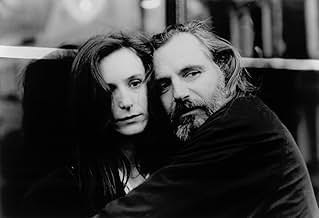VALUTAZIONE IMDb
7,8/10
16.139
LA TUA VALUTAZIONE
Tre storie d'amore interconnesse sotto la minaccia della guerra civile in Macedonia e Londra.Tre storie d'amore interconnesse sotto la minaccia della guerra civile in Macedonia e Londra.Tre storie d'amore interconnesse sotto la minaccia della guerra civile in Macedonia e Londra.
- Candidato a 1 Oscar
- 29 vittorie e 4 candidature totali
Grégoire Colin
- Kiril
- (as Gergoire Colin)
Trama
Lo sapevi?
- QuizPrima della pioggia (1994) was the first feature made in the newly declared republic of Macedonia, part of the former Yugoslavia. It was also the first Macedonian film to be nominated for an Oscar.
- BlooperIn the restaurant, over 30 shots are fired with a pistol without reloading.
- Citazioni
Father Marko: Time never dies. The circle is never round.
- Curiosità sui creditiThe film begins with a pan over a Macedonian sky covered by dark clouds at dusk. We hear sounds of thunder, when an epigraph from the novel "Dervis i smrt" (The Dervish and Death) by Mesa Selimovic appears on the screen, while a voice is heard reading it: "With a shriek birds flee across the black sky, people are silent, my blood aches from waiting". Afterwards, the titles appear.
- ConnessioniReferenced in The 67th Annual Academy Awards (1995)
- Colonne sonoreTime Never Dies
Kaval by Dragan Dautovski
Psaltery by Cengis Ibraim
© 1994 PolyGramComposed By by Anastasia
Arranged and produced by Anastasia
(P) 1994 PolyGram
Recensione in evidenza
This movie is absolute perfection. I can't believe it took me 10 years to bump into it by accident. I was surprised to see it was made in 1994 when the entire time I watched it as a reflection rather than prophecy of the civil war that followed.
The fluency of picture, music, and the story is perfect as viewer is taken from dramatic landscapes and slow paced life of orthodox priests to fast paced London streets and offices. Parallel stories in London fasten the pace even more.
The movie shows we are all connected not only in time (past and future) but space (geography) as well. War and suffering in one part of the world affect lives of people in quaint London restaurant. The circle of human tragedy connects almost every character in the movie. But circle is imperfect. If the circle were perfect the tragedy would stop when circle completes. Alas, the tragedy spirals in time and space.
Acting is very real. Time is not wasted overbuilding any character. The way soundtrack blends with the movie is pure art. Thank you for this movie Mr. Manchovski. As powerful as the movie is, it's unfortunate it didn't help prevent the civil war in Macedonia. When hate wins, innocence looses.
The fluency of picture, music, and the story is perfect as viewer is taken from dramatic landscapes and slow paced life of orthodox priests to fast paced London streets and offices. Parallel stories in London fasten the pace even more.
The movie shows we are all connected not only in time (past and future) but space (geography) as well. War and suffering in one part of the world affect lives of people in quaint London restaurant. The circle of human tragedy connects almost every character in the movie. But circle is imperfect. If the circle were perfect the tragedy would stop when circle completes. Alas, the tragedy spirals in time and space.
Acting is very real. Time is not wasted overbuilding any character. The way soundtrack blends with the movie is pure art. Thank you for this movie Mr. Manchovski. As powerful as the movie is, it's unfortunate it didn't help prevent the civil war in Macedonia. When hate wins, innocence looses.
I più visti
Accedi per valutare e creare un elenco di titoli salvati per ottenere consigli personalizzati
- How long is Before the Rain?Powered by Alexa
Dettagli
- Data di uscita
- Paesi di origine
- Sito ufficiale
- Lingue
- Celebre anche come
- Before the Rain
- Luoghi delle riprese
- Aziende produttrici
- Vedi altri crediti dell’azienda su IMDbPro
Botteghino
- Budget
- 1.900.000 USD (previsto)
- Lordo Stati Uniti e Canada
- 763.847 USD
- Lordo in tutto il mondo
- 763.847 USD
Contribuisci a questa pagina
Suggerisci una modifica o aggiungi i contenuti mancanti


























